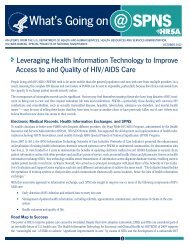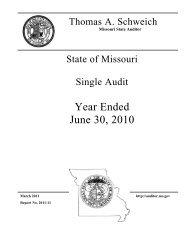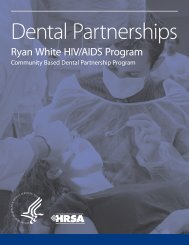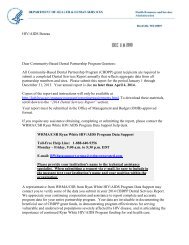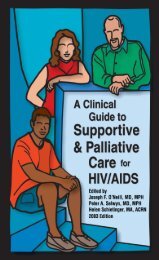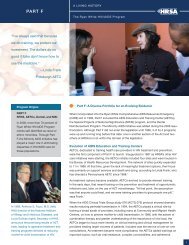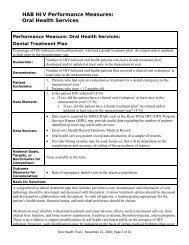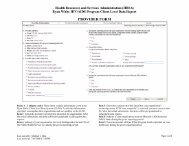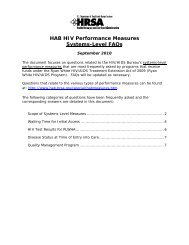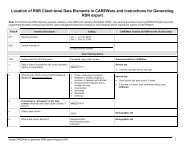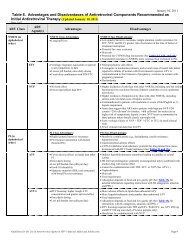clinical assessment of need that is reassessed andreevaluated periodically. The medical case managerneed not be located in the primary care facility, but he orshe must work closely and directly with the primary careprovider.Failure to address this paradigm shift could result incase management activities that are impermissibleunder core medical services, thus jeopardizing the abilityof providers to meet the requirement that 75 percent ofservice dollars be allocated to core medical services.Through the use of future evaluation projects, HABwill work to further define core competencies and identifymeasures to assess the quality of Ryan White casemanagement services.Collaboration Across <strong>Programs</strong>Connecticut and Medical Case Management<strong>HIV</strong> case management in the State of Connecticut isfunded by Ryan White <strong>HIV</strong>/<strong>AIDS</strong> Program Parts A–D.During FY 2007, 39 agencies received more than $4 millionin Ryan White <strong>HIV</strong>/<strong>AIDS</strong> Program funding to providecase management services. 3 Last summer, the Part Bprogram took the lead in convening representativesfrom Parts A–D to discuss the creation of statewidemedical case management standards. With the assistanceof a facilitator, the group began discussing currentmodels of case management and the needs of differentgeographical areas across the State to obtain a statewideperspective on the issue.At the time of the first meeting, the Part B providerhad not made final funding decisions for the year. ThePart B program had had internal discussions about medicalcase management centered on the need to createefficiencies in the model(s) of case management, thepossible use of an acuity scale to assess need, data collection,and the creation of performance indicators.Connecticut had begun a series of training meetings forcase managers entitled “Introduction to Medical CaseManagement.” The goal was to familiarize case managerswith the new medical model.Connecticut has two transitional grant areas (TGAs):Hartford and New Haven. (TGAs are cities with a totalpopulation of at least 50,000 and between 1,000 and1,999 reported <strong>AIDS</strong> cases in the past 5 years.) 2 The Stateincludes several urban, suburban, and rural areas.<strong>HIV</strong> service delivery is always challenging in ruralareas. Stigma, transportation, and a lack of services arejust a few of the major barriers affecting access andretention in care services. To address the need forprimary medical care, a significant portion of the medicalcare in Connecticut’s rural areas is provided byprivate physicians. The State also has a large network ofcommunity-based case managers in rural and urbanareas; many of them already perform some, if not all,service components of medical case management. RyanWhite <strong>HIV</strong>/<strong>AIDS</strong> Program providers across the Stateoften receive funding from more than one Ryan WhiteProgram component.Part A <strong>Programs</strong>Part A TGA programs in New Haven and Hartford hadalready developed service definitions, which wereapproved by their respective Planning Councils whenthis collaboration first began. Both Part A programsacknowledged that service definitions were only a smallpart of the work ahead; other tasks included the developmentof standards, the need for training amongproviders and clients, and discussions of the need to createor enhance linkages of medical case management toother service categories.They welcomed the opportunityto work with others in completing this task and madethe group aware of the role of the Planning Councils andother timeframes and deadlines specific to their localcity procurement and quality management processes.Part C ProvidersSeveral Part C providers discussed their work and therole of medical case managers in their programs.Because of the focus on primary care for the Part C programand its origins in the Bureau of Primary HealthCare, medical case management is the predominantmodel of case management. The processes and procedures,forms, standards, and best practices were alreadyin place, as was the requirement to spend at least 75 percentof funding on core medical services in place. ThePart C representatives agreed to share their knowledgeand expertise in the effort to create statewide standards.Part D <strong>Programs</strong>Part D programs are structured on a family-centeredmodel that allows providers to work with the affectedfamily member. Medical case management for theseprograms involves partnerships between case managementservice providers and nursing or clinical coordination.Some of these partnerships involve other RyanWhite-funded clinics. The close connection betweencase management and clinical care is integral to Part D4
programs and has also allowed them to develop andtrack clinical indicators for their patients.The Part D programs,too, offered to share their experience and knowledgewith the working group.Process and Results in ConnecticutOver the course of several meetings, the group agreedon a uniform definition of medical case managementthat contained all the critical activities as defined byHAB. The collaborative working group developed a setof core standards of care, with indicators and outcomesreflecting the minimum expectations for the delivery ofmedical case management in Connecticut for all Parts.Core standards are applicable in both community andclinic-based case management programs. Each Part wasgiven the option of adding to (but not deleting from)the core standards to meet the needs of its service populations.The standards will also go through an approvalprocess by the Part A planning bodies.The group agreedto reconvene in 6 months to discuss successes andchallenges and make adjustments to the core set ofstandards as needed at that time.Lessons LearnedHaving an outside facilitator help explain HAB’s expectationsprovided everyone with an opportunity to hearthe same message regarding the issue of medical casemanagement and thereby helped unify the grouparound a common understanding. This approachenabled the group to begin its tasks with clear directionand purpose. The process also enabled participants toshare their expectations and then come to a consensuson a set of medical case management standards andoutcomes that could be used statewide and adapted tothe specific needs of each Part and geographic area.The expertise of the Part C and D grantees helpedenrich the process and may have enabled the group tocomplete its tasks in less time than expected.These programsbrought important working knowledge of existingmedical case management practices and assessmenttools to the meetings. The “real-life” perspectivefocused discussions as the group brainstormed on whatto include as part of the core standards.The assistance of staff and program support wasinvaluable to the group in compiling and analyzing dataThe close connection between case management and clinical care is integral to Part D programs.5



